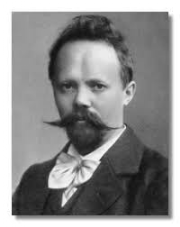Engelbert Humperdinck
Engelbert Humperdinck was born at Siegburg in the Rhine Province in 1854. After receiving piano lessons, he produced his first composition at the age of seven. His first attempts at works for the stage were two singspiele written when he was 13. His parents disapproved of his plans for a career in music and encouraged him to study architecture. Nevertheless, he began taking music classes under Ferdinand Hiller and Isidor Seiss at the Cologne Conservatory in 1872. In 1876, he won a scholarship that enabled him to go to Munich, where he studied with Franz Lachner and later with Josef Rheinberger. In 1879, he won the first Mendelssohn Award given by the Mendelssohn Stiftung (foundation) in Berlin. He went to Italy and became acquainted with Richard Wagner in Naples. Wagner invited him to join him in Bayreuth, and during 1880 and 1881 Humperdinck assisted in the production of Parsifal. He also served as music tutor to Wagner's son, Siegfried.
After winning another prize, Humperdinck traveled through Italy, France, and Spain and spent two years teaching at the Gran Teatre del Liceu Conservatory in Barcelona. In 1887, he returned to Cologne. He was appointed professor at the Hoch Conservatory in Frankfurt in 1890 and also teacher of harmony at Julius Stockhausen's Vocal School. By this time he had composed several works for chorus and a Humoreske for small orchestra, which enjoyed a vogue in Germany.
Humperdinck's reputation rests chiefly on his opera Hänsel und Gretel, on which he began work in Frankfurt in 1890. He first composed four songs to accompany a puppet show his nieces were giving at home. Then, using a libretto by his sister Adelheid Wette rather loosely based on the version of the fairy tale by the Brothers Grimm, he composed a singspiel of 16 songs with piano accompaniment and connecting dialogue. By January 1891 he had begun working on a complete orchestration.
The opera premiered in Weimar on 23 December 1893, under the baton of Richard Strauss. With its highly original synthesis of Wagnerian techniques and traditional German folk songs, Hansel and Gretel was an instant and overwhelming success.
Hansel and Gretel has always been Humperdinck's most popular work. In 1923 the Royal Opera House (London) chose it for their first complete radio opera broadcast. Eight years later, it was the first opera transmitted live from the Metropolitan Opera (New York).
On 5 January 1912 Humperdinck suffered a severe stroke. Although he recovered, his left hand remained permanently paralyzed. He continued to compose, completing Gaudeamus with the help of his son, Wolfram, in 1918. On 26 September 1921 Humperdinck attended a performance of Carl Maria von Weber's Der Freischütz in Neustrelitz, Wolfram's first effort as a stage director. He suffered a heart attack during the performance and died the next day from a second heart attack. The Berlin State Opera performed Hansel and Gretel in his memory a few weeks later. He was buried at the Südwestkirchhof [de] in Stahnsdorf near Berlin.














 My Wish List
My Wish List










